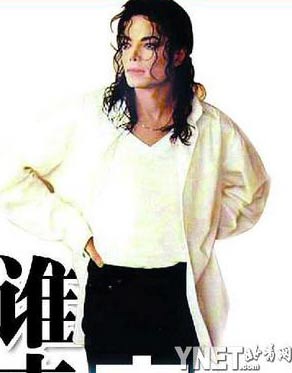| 杰克逊命运谁决定(图) |
| http://www.sina.com.cn 2005/03/30 16:19 北京青年报 |
 谁来决定杰克逊的命运 The trial of pop star Michael Jackson is the latest US legal spectacle to capture the world's attention. My Chinese friends are puzzled by one aspect of the case -- the role of the twelve jurors in deciding Jackson's fate. How, exactly, does the jury system work? The jury traces its roots back at least 1000 years as part of the English legal tradition. Before the jury, judges relied on God to determine guilt, subjecting the accused to tests thought to require divine intervention. They might, for instance, force a defendant to hold a red-hot stone. If the burn healed quickly, "God" had revealed his innocence; if an infection developed, he was guilty. As these arbitrary techniques were discredited, the courts were forced to find something new, and stumbled upon the jury. If a defendant could find "a few good and honorable men" to attest to his innocence, he would be set free. In pre-industrial England, this system worked because communities were close-knit. It was expected that townspeople would use their knowledge of each other to help the judge determine the truth. From these beginnings, the idea developed that ordinary citizens, sitting as a "jury", be called to pass judgment on their peers. Today the jury is expected to be impartial, and serving on the jury is one of the rights and duties of citizenship. Citizens are selected for jury service by the court in their city or town. Each week the court sends a notice in the mail to a randomly selected group of citizens requiring service in the "jury pool". Rules limit citizens to jury service once every few years, and in most places citizens serve far less frequently -- perhaps once a decade. When they arrive at the court, they are chosen by lottery for one of the cases starting that day. The judge, or in some cases the prosecutor and the defense attorney, then question potential jurors to ensure that they would decide the case fairly; anyone with a bias is disqualified. The jury has sole responsibility for deciding which side is telling the truth about the "facts" of the case. During the trial, the prosecutor and the defense lawyer both present evidence and arguments to the jury. The judge ensures that the rules of procedure and evidence are followed in the courtroom, and can address the jury to make sure all members understand the relevant laws. After hearing the testimony of witnesses and viewing the evidence, the jury retreats to a private room to reach a unanimous decision of "guilty" or "not guilty". How can we trust ordinary people, who lack specialized legal training, to decide a criminal case? Citizens use common sense in their daily lives, and we ask them to rely on that same common sense when they assess the evidence they hear in court. The jury system provides an important protection against abuse of power by government officials. The right to a jury trial prevents police and prosecutors from locking someone up without first proving to a group of ordinary citizens that he or she deserves punishment. If the jury says "not guilty", then the courts and police must release the defendant. And to establish guilt, the jury must come to unanimous agreement -- if even one juror disagrees, the defendant cannot be found guilty of the crime. The jury system promotes other important social goals. Though jury service is mandatory, most citizens say that they enjoy the experience, and that it enhances their knowledge of the legal system. Juries also reflect our belief in the value of ordinary citizens' participating in government. Along with voting, passing judgment on one another is the most direct way citizens can participate in self-governance. But these values come at a cost. Juries are expensive and we only use them in the most difficult cases. Though every defendant has a right to a full jury trial, in most cases the defendant simply admits guilt in return for a lower penalty -- a system we call "plea bargaining". The system has other flaws. The biggest practical issue is ensuring that the jury is truly made up of the defendant's "peers". Certainly Michael Jackson is an unusual figure, and not exactly an "ordinary" citizen, even in California. Some have questioned whether a defendant with unusual habits or views can get a fair trial. Furthermore, until a few decades ago black Americans were regularly judged guilty of crimes by all-white juries, and women could be judged by twelve male jurors. Though juries now draw members from all sectors of society, social problems like discrimination can still distort their fairness. Of course, in some cases juries simply make mistakes. The last US trial to attract worldwide attention -- the OJ Simpson murder trial -- is thought by many to have been wrongly decided. Yet most Americans believe that a few mistakes are worth tolerating in order to obtain the overall fairness that the jury system promises. Is Michael Jackson guilty? Only the jury can decide. |
| 老外直言:谁来决定杰克逊的命运 |
(本文作者是耶鲁大学法学院中国法律中心研究员、北京大学法学院访问学者) 最近,对流行歌星迈克尔-杰克逊的审判,成为了吸引全世界眼球的美国司法要事。我的中国朋友对此案中的一点感到不解——那就是决定杰克逊命运的十二名陪审员的角色是怎么回事,陪审团系统到底是怎么运作的呢? 陪审团可以追溯到至少一千年前,它是英格兰法律传统的一部分。在陪审团出现之前,法官依靠上帝来判定罪行,他们让被告接受据信是请神明介入的测试——可能强迫他握住一块烧红的石头,如果烫伤处很快愈合,“上帝”就昭示了他的清白;如果引发了感染,那他就是有罪。鉴于此类武断的方法不足采信,法庭不得不寻找新的办法,不知怎的就有了陪审团。如果被告能找到“几个正派而可敬的人”来证明他的清白,他就会被释放。在前工业化时代的英格兰,这个制度是有效的,因为居民社区的联系十分紧密,人们期望通过市民之间的相互了解来帮助法官断出真相。从一开始,这个想法就发展为一些普通市民被召来作为“陪审团”坐在那里,对与己地位相同的人进行宣判。 而今,人们期待着陪审团公正审判,而在陪审团工作也是公民的权利和义务。公民们将接受本市或本城法院的挑选,成为陪审团成员。每一周,法庭以信件形式通知随机挑出的一组公民,请他们作为“陪审团候选人员”。有关条款限定公民每几年就要在陪审团工作一次,但大多数地方频度极低——可能十年才一次。这些候选人员到了法庭之后,通过抽签成为当天开庭的某个案子的陪审员。接着由法官(在某些情况下是检察官和被告的辩护律师)向候选的陪审员们提出问题,以确信他们能够公正地判决;任何有偏见的人将会丧失陪审员资格。 陪审团的唯一职责是决定哪一方对案件“事实”讲了真话。在审判期间,检察官与被告律师均向陪审团出示证据,提出论据。法官则要确保法庭审判按照程序规则和证据规则进行,还可能向陪审团做出解释,以确保所有成员理解相关法律。在听过证人的证词并看过证据之后,陪审团退到一个私密房间以达成一致的决议——“有罪”或是“无罪”。 我们怎么能信任缺乏专门法律训练的普通人来判定一桩刑事案呢?公民们在日常生活中运用的是常识,而我们要求他们在法庭上审查证据时依靠同样的常识去判断。陪审团制度为制止政府官员滥用职权提供了重要保障。被告申请陪审团审判的权利使警方和检察官不得在向一组普通市民表明某人该当惩处之前便将其关押起来。如果陪审团说“无罪”,法庭与警方就必须释放被告人;而要认定被告有罪,陪审团的意见须达成一致———即使只有一个陪审员不同意,被告也不能被认定为有罪。 陪审团制度还促进了其它重要社会目标的实现。虽然作为陪审团成员的工作是强制性的,但大多数公民说他们喜欢参与,说这一参与增强了他们对法律体系的了解。陪审团制度还反映了我们深信普通民众参政的价值。和投票选举一样,公民彼此间的宣判也是参与自治的最直接的方式。 但是这些价值的实现是有成本的。陪审团很耗资,因而只在最困难的案件中采用。虽然每个被告都有权得到充分的陪审团审判,但在大多数案件中,被告会直接认罪,以换取较轻的处罚——我们称之为“认罪辨析协议”制度。 陪审团制度还有其它缺陷。最大的实际问题是如何确保陪审团真的由与被告“同等地位的人”组成。迈克尔-杰克逊肯定是个不寻常的人物,也算不得一个“普通”公民,即便是在明星云集的加州也是如此。有人就质疑过一个有着不寻常习惯或观点的被告能否得到公正的审判。此外,直到数十年前,黑人总是被全由白人组成的陪审团宣判有罪,女被告则有可能受到由十二名男人组成的陪审团的审判。虽然现在陪审团是从社会各阶层抽取成员,但一些社会问题诸如对某一群体的歧视,仍然会扭曲它的公正性。 当然,在有些案件中陪审团也真会犯错。在此之前,发生在美国引起全世界关注的、一场审判——辛普森杀人案——很多人都认为是判错了。但是大多数美国人仍然相信,为了得到陪审团制度提供的大体上的公正,容忍少数错误还是值得的。那么,迈克尔-杰克逊是否有罪呢?只有陪审团才能决定。(作者:Jeffrey Prescott 美国) |
|
|
|
|
|
| Annotation |
| 新 闻 查 询 |
| 热 点 专 题 | ||||
| ||||
|
教育频道意见反馈留言板 电话:010-82628888-5747 欢迎批评指正
新浪简介 | About Sina | 广告服务 | 联系我们 | 招聘信息 | 网站律师 | SINA English | 会员注册 | 产品答疑
Copyright © 1996 - 2005 SINA Inc. All Rights Reserved
版权所有 新浪网![]() 北京市通信公司提供网络带宽
北京市通信公司提供网络带宽